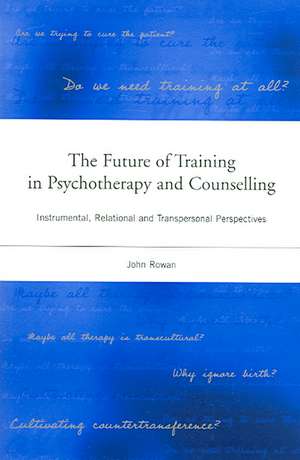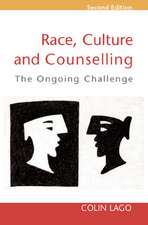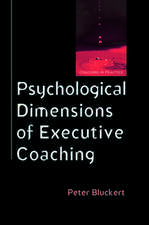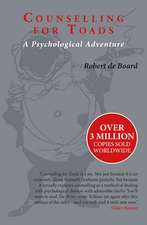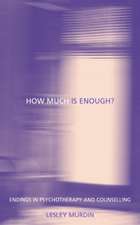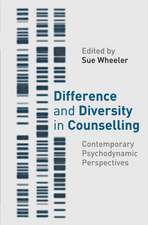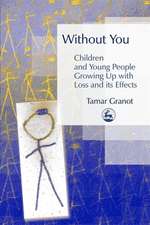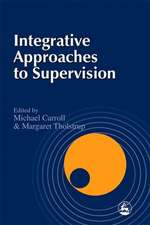The Future of Training in Psychotherapy and Counselling: Instrumental, Relational and Transpersonal Perspectives
Autor John Rowanen Limba Engleză Paperback – 22 apr 2005
In an attempt to look afresh at the whole question of training, John Rowan proposes that there are three ways of doing therapy and any examination of training has to consider each of these:
* the instrumental, where the main emphasis is on the treating the client or patient
* the authentic way, where the main emphasis is on meeting the client or patient
* the transpersonal way, where main emphasis is on linking with the client in a more personal way.
Each approach makes different assumptions about the self, about the relationship, and about the level of consciousness involved in doing therapy. By challenging the basic precepts of traditional training, John Rowan encourages the reader to reconsider subjects including the difference between counselling and psychotherapy, culture and ethics, the origins of disturbance in clients, and child development.
The Future of Training in Psychotherapy and Counselling provides a much needed new perspective that will compel all psychotherapists and counsellors to take a closer look at training in the field.
Preț: 267.68 lei
Preț vechi: 281.77 lei
-5% Nou
Puncte Express: 402
Preț estimativ în valută:
51.23€ • 53.34$ • 43.29£
51.23€ • 53.34$ • 43.29£
Carte disponibilă
Livrare economică 17 februarie-03 martie
Livrare express 01-07 februarie pentru 33.23 lei
Preluare comenzi: 021 569.72.76
Specificații
ISBN-13: 9781583912362
ISBN-10: 1583912363
Pagini: 272
Dimensiuni: 138 x 216 x 21 mm
Greutate: 0.5 kg
Ediția:1
Editura: Taylor & Francis
Colecția Routledge
Locul publicării:Oxford, United Kingdom
ISBN-10: 1583912363
Pagini: 272
Dimensiuni: 138 x 216 x 21 mm
Greutate: 0.5 kg
Ediția:1
Editura: Taylor & Francis
Colecția Routledge
Locul publicării:Oxford, United Kingdom
Public țintă
Professional Practice & DevelopmentCuprins
Preface Introduction 1. Dialectical interpolation: There is and is not a difference between counselling and psychotherapy 2. Do we need training? Dialectical interpolation: We are and are not dealing with a distinct and separate individual 3. Theory. Dialectical interpolation: We know and do not know how children develop 4. Skills. Dialectical interpolation: We must and must not hold on to our model of the person as being the correct model 5. Supervision. Dialectical interpolation: We are and are not looking for the origins of disturbance in our clients: we are and are not looking to see how the problems are being maintained in the present 6. Own therapy and groupwork. Dialectical interpolation: We are and are not concerned with cure 7. Written work. Dialectical interpolation: We can and cannot take our own culture for granted 8. Ethics. Dialectical interpolation: Empathy is and is not a skill 9. Research. Dialectical Interpolation: We must believe and disbelieve the client 10. Dangerous omissions. Dialectical Interpolation: Integrative psychotherapy is and is not integrative 11. The body in psychotherapy Appendix: The keyboard of interventions.
Notă biografică
John Rowan, is in private practice in London. Author of Ordinary Ecstasy: The Dialectics of Humanistic Psychology, 3rd ed., The Reality Game: A Guide to Humanistic Counselling and Psychotherapy and The Transpersonal: Psychotherapy and Counselling.
Recenzii
'A book principally aimed at psychotherapists to encourage them to think about the nature of training and therefore practice... a complex but highly informed discussion that will enhance the understanding of practitioners in the field.' - The Scientific Medical Network Review
'to my mind all counselling and psychotherapy trainers and tutors should be reading this if they have any intention to remain updated and to make necessary changes to courses'. - Colin Feltham, British Journal of Guidance and Counselling
'With its presentation of new perspectives and detailed exploration of issues key to the future of psychotherapy and counselling, this book will be of interest and value to both trainers and trainees' - Vikki Kelly, The Journal of Critical Psychology, Counselling and Psychotherapy (Vol. 7, No. 4)
'A book principally aimed at psychotherapists to encourage them to think about the nature of training and therefore practice... a complex but highly informed discussion that will enhance the understanding of practitioners in the field.' - The Scientific Medical Network Review
'to my mind all counselling and psychotherapy trainers and tutors should be reading this if they have any intention to remain updated and to make necessary changes to courses'. - Colin Feltham, British Journal of Guidance and Counselling
'With its presentation of new perspectives and detailed exploration of issues key to the future of psychotherapy and counselling, this book will be of interest and value to both trainers and trainees' - Vikki Kelly, The Journal of Critical Psychology, Counselling and Psychotherapy (Vol. 7, No. 4)
'A book principally aimed at psychotherapists to encourage them to think about the nature of training and therefore practice... a complex but highly informed discussion that will enhance the understanding of practitioners in the field.' - The Scientific Medical Network Review
Descriere
John Rowan presents a challenging account of the current state of training. In an attempt to look afresh at the whole question of training he proposes that there are three ways of doing therapy: the instrumental, the authentic and the transpersonal way.
